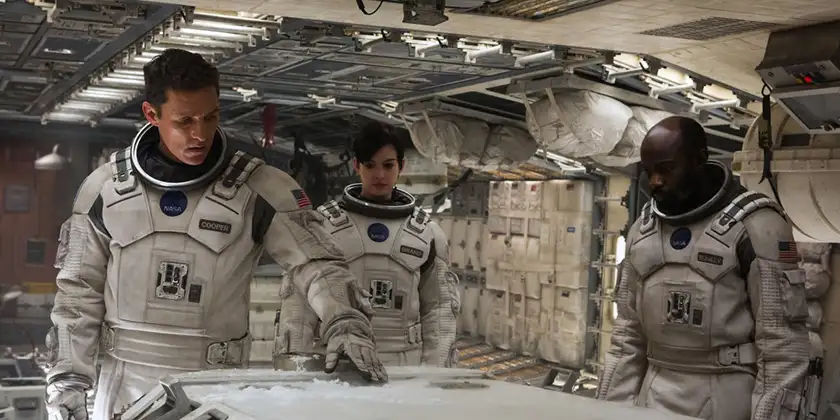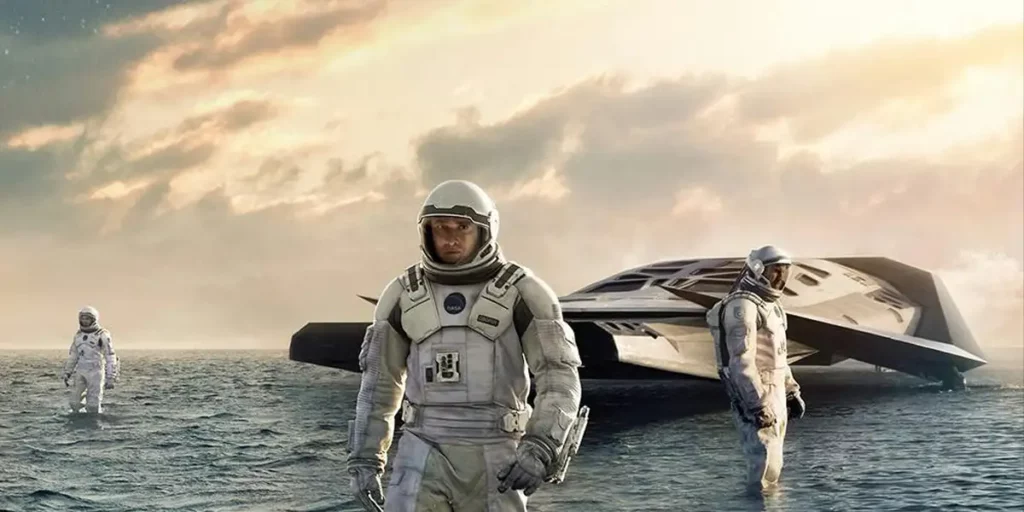With the movie Interstellar, sci-fi auteur Christopher Nolan reframes humanity’s search for meaning among the stars by posing a different, more important question.
This analysis contains spoilers for the movie ‘Interstellar’ (2014).
“We used to look up at the sky and wonder about our place in the stars. Now we just look down and worry about our place in the dirt.”
Since the first scientific understandings of space and the universe were developed, the question of humanity’s purpose and why we’re here has been the leading question of our species. Even long before that, when humans were nothing more than cavemen looking at the bright lights above them, it’s hard to imagine that they didn’t question what lies above. It’s a question that characterises the meaning of Christopher Nolan’s formative sci-fi epic Interstellar, at least on the narrative level, which follows a group of scientists leading a mission to find humanity’s new home in the cosmos once Earth finally becomes uninhabitable.
Each planet they visit brings new dangers and poses new threats, leading the team to worry that their search for developed life beyond Earth is futile. At least until the true meaning of Nolan’s story finally reveals itself in the final act, and the mission is saved with the help of further-evolved humans from the future that have developed the ability to transport their knowledge through time. The statement is clear: if the answer to our questions can’t be found among the stars, perhaps we don’t need to look any further than ourselves to discover our true purpose. Nolan’s decision to have humanity save the day at the end of Interstellar is a fascinating one, and one that might seem counterintuitive at first glance. Why string the audience along with the promise of intelligent life just to reveal that it was humanity all along? Isn’t that a cheap cop-out?
However, to ask that question is to fundamentally misunderstand why Nolan spends so much time discussing aliens and faraway planets in Interstellar. He isn’t setting out to answer humanity’s age-old questions about why we’re here or if there’s anything else out there, but he’s completely reframing the discussion into one about making the most of the knowledge and science that we do understand. Evolution is a natural and necessary step in any species’ lifespan – you wouldn’t be reading this without hundreds of thousands of years of our species’ adaptation and modification, and we’re still undergoing that process for the humans that will succeed us. The present humans and the future humans need each other to survive in Interstellar, and it’s not until McConaughey’s protagonist Cooper and his team understand their importance in humanity’s story that they stop worrying about their role in the universe’s.

But why ask these questions of existence in the first place if Nolan is simply going to disregard them with a shocking reveal in the final act? Why include so much discussion about the possibility of alien lifeforms, communication with other species, or uncovering humanity’s cosmic purpose if they’re not ultimately important to Interstellar’s true meaning? It might seem frustrating at first, and it’s the main reason that so many audiences need ‘thinking time’ after Nolan’s movies to fully appreciate them. He’s taking us on a journey throughout the film – not just a narrative journey, but also one of philosophy.
Nolan wants the audience to invest themselves in these existential questions, just like Cooper and his daughter Murph are at the beginning of the story, searching for the answers to questions that will eventually prove impossible to answer, in order to force us into sharing their philosophical revelation at the end. We need to reach these conclusions on our own, experiencing this shift in thought alongside the characters. Interstellar poses these questions in such an engaging way to make the gravity of the answer hit even harder. Is anybody else out there? Where are we heading? Why are we here? The answer: nobody knows.
It’s this acceptance of our inability to know that makes Interstellar so revolutionary in its thought and important in the ongoing discussions that we’re still seeing today about the advancements in space travel and search for extraterrestrial life. Interstellar proves that humanity is so focused on finding answers that we often forget to discover things for ourselves. The quest for knowledge is something that’s innate to our species and has developed over countless years of evolution, but it’s also the one thing holding us (both in Interstellar and real life) back from achieving our full potential. By intentionally having his characters chase the wrong questions in Interstellar, Nolan delivers an extremely effective final blow as humanity comes face to face with its future generations and has to come to terms with a much more important question.
What can we do while we’re here?
Interstellar is now available to watch on digital and on demand.

